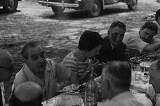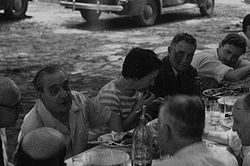
Luis Jiménez de Asúa
Encyclopedia

Jurist
A jurist or jurisconsult is a professional who studies, develops, applies, or otherwise deals with the law. The term is widely used in American English, but in the United Kingdom and many Commonwealth countries it has only historical and specialist usage...
and Spanish
Spanish people
The Spanish are citizens of the Kingdom of Spain. Within Spain, there are also a number of vigorous nationalisms and regionalisms, reflecting the country's complex history....
politician
Politician
A politician, political leader, or political figure is an individual who is involved in influencing public policy and decision making...
. He was vice president of the Spanish parliament and representative of that country before the United Nations
United Nations
The United Nations is an international organization whose stated aims are facilitating cooperation in international law, international security, economic development, social progress, human rights, and achievement of world peace...
. During the Francoist dictatorship he exiled himself to Argentina
Argentina
Argentina , officially the Argentine Republic , is the second largest country in South America by land area, after Brazil. It is constituted as a federation of 23 provinces and an autonomous city, Buenos Aires...
. In 1962 he was named president of the Spanish Republican government in Exile
Spanish Republican government in Exile
The Spanish Republican government in exile was a continuation of the government of the Second Spanish Republic, which was established in exile after the victory of Francisco Franco's forces in the Spanish Civil War in April 1939...
.
Biography
A professor of penal lawPenal law
In the most general sense, penal is the body of laws that are enforced by the State in its own name and impose penalties for their violation, as opposed to civil law that seeks to redress private wrongs...
at the Central University of Madrid
Complutense University of Madrid
The Complutense University of Madrid is a university in Madrid, and one of the oldest universities in the world. It is located on a sprawling campus that occupies the entirety of the Ciudad Universitaria district of Madrid, with annexes in the district of Somosaguas in the neighboring city of...
). He was confined to the Islas Chafarinas
Islas Chafarinas
The Chafarinas Islands , also spelled Zafarin, Djaferin, Zafarani, is a Spanish archipelago. A group of three small islets located in the Alboran Sea off the coast of Morocco with an aggregate area of 0.525 km², 45 km to the east of Melilla and 3.3 km off the Moroccan town of Ra'su l-Ma'...
in 1926, for his protest against the exile of Miguel de Unamuno
Miguel de Unamuno
Miguel de Unamuno y Jugo was a Spanish essayist, novelist, poet, playwright and philosopher.-Biography:...
by the dictatorship of Primo de Rivera. In 1931 he entered in the Spanish Socialist Workers' Party
Spanish Socialist Workers' Party
The Spanish Socialist Workers' Party is a social-democratic political party in Spain. Its political position is Centre-left. The PSOE is the former ruling party of Spain, until beaten in the elections of November 2011 and the second oldest, exceeded only by the Partido Carlista, founded in...
(PSOE) and was made a deputy in the Cortes Generales
Cortes Generales
The Cortes Generales is the legislature of Spain. It is a bicameral parliament, composed of the Congress of Deputies and the Senate . The Cortes has power to enact any law and to amend the constitution...
, presiding over the parliamentary commission that had been drafting the Constitution. Director of the Institute of Penal Studies, created by Victoria Kent
Victoria Kent
Victoria Kent was a Spanish lawyer and republican politician.Born in Málaga, she was affiliated to the Radical Socialist Republican Party and came to fame in 1930 for defending - at a court martial - Álvaro de Albornoz, who would shortly afterwards go on to become minister of justice and later the...
, he participated in the writing of the Criminal Code of 1932.
Belonging to the moderate wing of the PSOE, he was elected vice president of the Cortes Generales in the Spanish general election, 1936
Spanish general election, 1936
Legislative elections were held in Spain on February 16, 1936. At stake were all 473 seats in the unicameral Cortes Generales. The winners of the 1936 elections were the Popular Front, a left-wing coalition of the Spanish Socialist Workers' Party , Republican Left , Esquerra Republicana de...
. During the Spanish Civil War
Spanish Civil War
The Spanish Civil WarAlso known as The Crusade among Nationalists, the Fourth Carlist War among Carlists, and The Rebellion or Uprising among Republicans. was a major conflict fought in Spain from 17 July 1936 to 1 April 1939...
he occupied diplomatic charges of the Republic in Poland and Czechoslovakia and represented Spain in the League of Nations. Once the war was lost, he was exiled to Argentina
Argentina
Argentina , officially the Argentine Republic , is the second largest country in South America by land area, after Brazil. It is constituted as a federation of 23 provinces and an autonomous city, Buenos Aires...
in 1939, where he continued his educational career at the National University of La Plata and the National University of the Littoral
National University of the Littoral
The National University of the Littoral is a university in Argentina. It is based in Santa Fe, the capital of the province of the same name, and it has colleges and other academic facilities in Esperanza, Reconquista and Gálvez, also in Santa Fe Province.-History:The original institution was...
and the High School of Penal Law and Criminology at the University of Buenos Aires
University of Buenos Aires
The University of Buenos Aires is the largest university in Argentina and the largest university by enrollment in Latin America. Founded on August 12, 1821 in the city of Buenos Aires, it consists of 13 faculties, 6 hospitals, 10 museums and is linked to 4 high schools: Colegio Nacional de Buenos...
until the Revolución Argentina
History of Argentina (1966-1973)
Revolución Argentina was a period of military dictatorship from 1966 to 1973, spawned by the June 1966 military coup, and self-proclaimed by the Military junta as "the Argentine Revolution"....
of 1966. He directed the Magazine of Criminal Law and Criminology until his death. His Tratado de Derecho Penal in seven volumes, has been respected as a masterpieces of the matter. The Brazilian criminal lawyer Nelson Hungary has said that:
He maintained a close relation with the student organization reformists of Argentina. Among his disciples was Guillermo Estévez Boero
Guillermo Estévez Boero
Guillermo Estévez Boero was an Argentine student activist, lawyer and Socialist politician.Estévez Boero was born in Rosario, Santa Fe Province, and studied Law at the National University of the Littoral, where he was a disciple of the Spanish criminal expert and President in exile of the Second...
, who would be a president of the Argentine University Federation and then national representative of the Socialist Party of Argentina
Socialist Party (Argentina)
The Socialist Party is a social-democratic political party in Argentina. The history of socialism in Argentina began in the 1890s, when a group of people, notably Juan B. Justo, expressed the need for a greater social focus....
.
In 1962, he was appointed as president of the Republic in exile
Spanish Republican government in Exile
The Spanish Republican government in exile was a continuation of the government of the Second Spanish Republic, which was established in exile after the victory of Francisco Franco's forces in the Spanish Civil War in April 1939...
, a post he held until his death in 1970 when he was succeeded by José Maldonado Gonzalez
José Maldonado Gonzalez
José Maldonado González was the last president of the Spanish Republican government in Exile. Elected in the Spanish general election, 1936 as a deputy for Oviedo province, he was a member of the party Republican Left, which was a member of the Popular Front...
.
Works
- El Derecho penal del porvenir (1916)
- El estado de necesidad (1922)
- Al servicio del Derecho penal
- La teoría jurídica del delito (1931)
- Psicoanálisis criminal(1940) Buenos Aires, Losada.
- El criminalista (1941-1949, 8 vols)
- La Constitución política de la democracia española (1942)
- La ley y el delito (1945)
- La Constitución de la democracia española y el problema regional (1946)
- Tratado de Derecho penal (1949-1963, 7 vols.).

